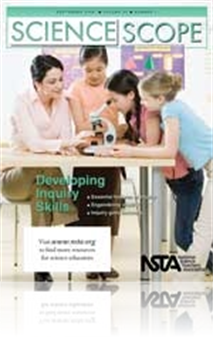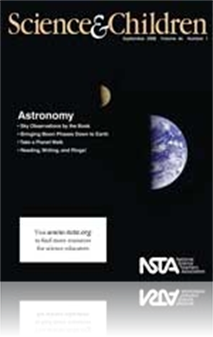All Resources
Journal Article
Scope on the Skies: Planets a go-go
The school year kicks off with a great parade of planets in the evening skies, as four of the six visible planets will make an appearance during the evening hours following sunset. For the first half of September, students will have an opportunity fo...
Journal Article
The National Science Education Standards (NSES) state that students in grades K—4 are expected to understand that astronomical objects in the sky, including the Sun, Moon, and stars—have properties, locations, and patterns of movement that can b...
Journal Article
Creativity in the Science Classroom
Though many teachers would like to incorporate creative activities into their teaching, there are few practical suggestions to help them accomplish this goal (Yager 2000). In this article, the authors introduce four strategies to help integrate creat...
Journal Article
Case Study: To Boldly Go… Or Not
This public-hearing case study is centered upon the recent decision by President George W. Bush to set NASA’s primary goal as a return to the Moon, followed by a mission to Mars. The members on the expert panel are fictitious and the transcript con...
Journal Article
Earth Science Week (ESW) 2008 encourages people around the globe to open doors and investigate new opportunities. This year’s theme, “No Child Left Inside,” is a call to explore our natural environments. The celebration urges everyone—especia...
Journal Article
Methods and Strategies: The Science Representation Continuum
Research indicates that people more easily understand abstractions when they are preceded by concrete representations (Lawson 2002). This article describes how educators can use science representations to help students form lasting understandings of ...
Journal Article
The Prepared Practitioner: Supporting New Teachers
New school years bring new challenges, students, lessons, and colleagues. Some teachers at your school may be just starting out with their first teaching job. Looking ahead to a new school year is a great time for all of us to think about understandi...
Journal Article
What can glaciers tell us about volcanoes and atmospheric conditions? How does this information relate to our understanding of climate change? Ice Core Investigations is an original and innovative activity that explores these types of questions. It b...
Journal Article
Teaching Through Trade Books: Moon Phases and Models
From the time they are very young, children are naturally curious about the Moon. They may wonder about the different shapes of the Moon when they look up at the night sky. In this month’s primary lesson, students discover through direct observatio...
Journal Article
Idea Bank: Presidential “Periodic Table”
The Presidential “Periodic Table” is an engaging activity that encourages high school chemistry students to match the names of the elements with their chemical symbols in order to spell out the names of the 43 U.S. presidents. By completing the p...
Journal Article
As educators, we know that math must be integrated into our subject to best communicate the essence of scientific investigation. Unfortunately, this is easier said than done when students learn subjects in isolated classrooms on a daily basis. As you...
Journal Article
Point of View: The Scientific Method and School Science
Can we assume that science teachers and graduates understand the scientific method and the meaning of key terms such as theory, law, and fact? Selby (2006) notes that the “current debate about teaching Intelligent Design in science classes is revea...
Journal Article
Career of the Month: An Interview with Shark Advocate Sonja Fordham
Most sharks are the top predators in their ecosystems, yet they are often at the bottom of the conservation priority list. Because they are under-protected and exceptionally slow growing, and therefore valuable to overfishing, most of the world’s s...
Journal Article
Students’ understanding of science develops through everyday experiences. As a result, they come to the science classroom with their own notions of how the world works. As teachers, we often must help students overcome their prior naïve notions an...
Journal Article
Idea Bank: Emphasizing Safety in the Classroom
With the popularization of inquiry-based learning in science classes at all levels, laboratory instructors must be proficient in the proper handling of hazardous substances. This care in dealing with potentially harmful materials should also be commu...
Journal Article
Physical models in the classroom “cannot be expected to represent the full-scale phenomenon with complete accuracy, not even in the limited set of characteristics being studied” (AAAS 1990). Therefore, by modifying a popular classroom activity ca...
Journal Article
A Message from the NSTA President: Science Education—The Times They are A-Changin’
Inspired by her favorite Bob Dylan song of 1964, “The Times They Are A-Changin”—NSTA President Page Keeley’s presidential theme during her 2008-09 tenure will be “From Transition to Transformation—Striving for a Science-Literate Nation.�...
Journal Article
In this article, the authors describe a two-phase inquiry lesson in which students explore the catalytic activity of amylase on starch (Rungruangsa and Panijpan 1979). In the first phase, students’ prior knowledge about the reaction is assessed thr...
Journal Article
Science Sampler: Inquiry goes outdoors—What can we learn at the pond?
The Oregon 4-H Wildlife Stewards program has been training teachers and volunteers to convert school grounds to education sites by constructing schoolyard wildlife habitats since 1997. The publication What Can We Learn at the Pond? 4-H Wildlife Stewa...






